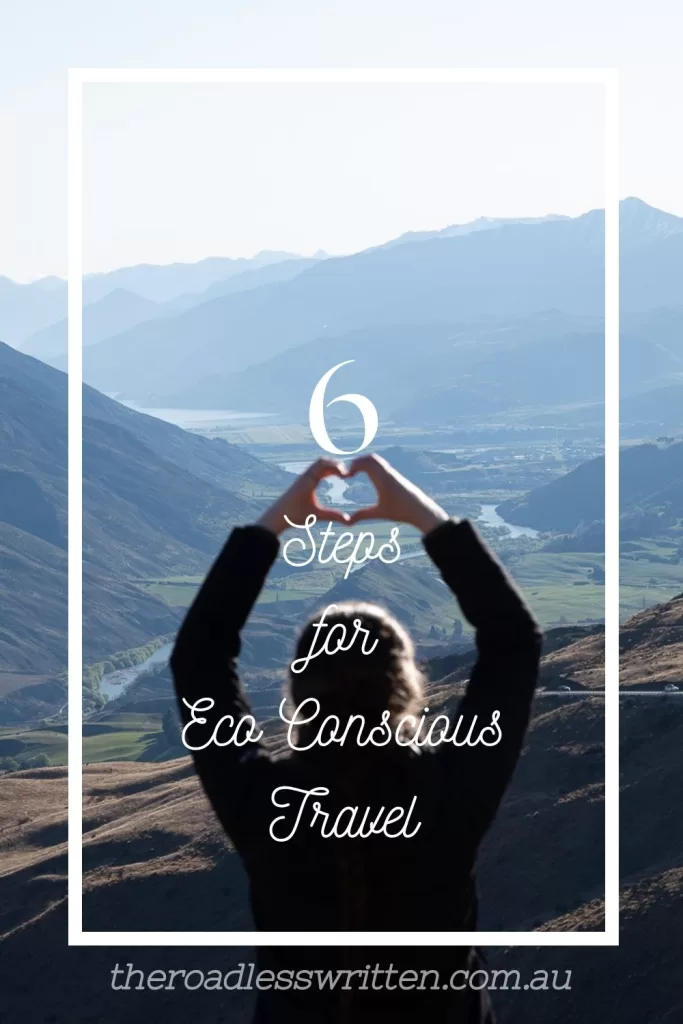What is conscious travel you may ask? Well, from our point of view, it’s someone who travels with the environment and other people in mind. It’s a person who realises they are extremely privileged to travel and does their best to ensure they respect that privilege. It means making sure there is a world where travel is available to us in the future in more sustainable and respectful ways. It’s the realisation that you are being welcomed onto someone else’s land and acknowledging that there are often complex relationships at play with that land; especially if you are travelling to a colonised country. It’s respecting the culture and people of the place you visit and the nature/country. Ultimately, it is how we strive to travel and how we wish to inspire others to travel as well.
We have come to realise that a lot of the problems we notice in how we travel are that we aren’t thinking enough about the impact. Whether that is the impact on the environment, the people, or the local economy. We’ve all become a bit disconnected from those around us, not just in travel, but everyday life as well. We value convenience over doing what is right. But more than that, we don’t stop to think that what we are doing could be detrimental. Basically, we aren’t being mindful or conscious of the impact our choices and actions have on others. It’s a conversation people are starting to delve into more since the pandemic and with the climate crisis on our doorstep. The travel world is no different, looking at itself and asking where we can make change and become more conscious.
Think About Those Around You
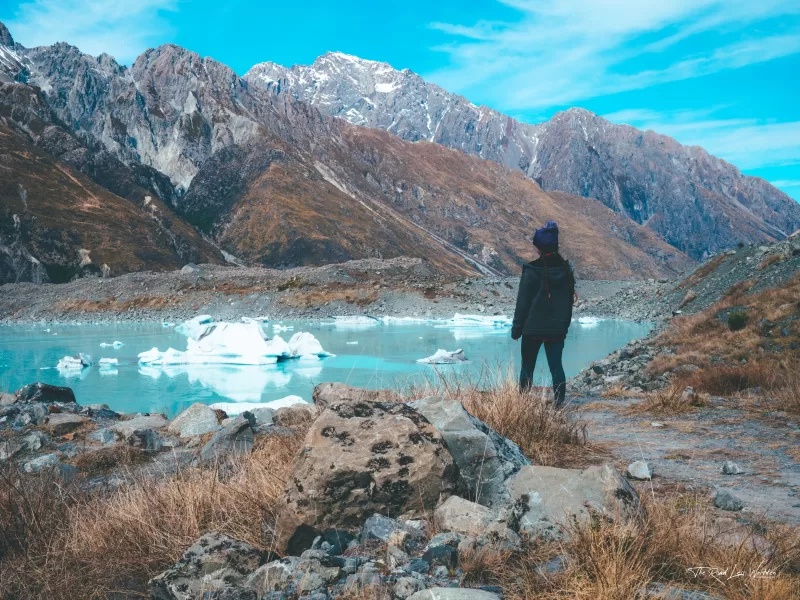
Originally, we were going to call this one how to not be a jerk. We think it’s catchy and sums it up pretty well. However, we figured that wouldn’t really help the situation. So we went with thinking about those around you. It’s easy to forget the impact we have on people around us. We aren’t really talking about friends or family (although we do impact them) we mean complete strangers. The person sitting behind you on a plane. Or the couple enjoying the view from the mountain top you have all recently hiked up to. The way you act in these spaces affects others and lately we don’t seem to think about that enough. Taking your shoes off on a plane and propping your feet up on the back of someone’s arm rest, for example. Or talking loudly on speaker phone whilst others are trying to enjoy the peace of a hike. All things that have little impact on yourself but make a HUGE difference to the experience of others. (Yes, we have experienced both these things.)
It’s these thoughtless acts that can often give travellers a bad name. Let’s change this together by just being mindful of people around you and the area you are in. No one wants to smell your feet on a plane, nor do they want to hear about your trip whilst trying to hike in nature. If we stopped to think how we would feel if a bystander was acting like that in our presence, the answer would be the same for all of us. We’d be pretty annoyed! This is the first step to take on your conscious travel journey, and it’s literally as advertised; to be conscious of your effects on others. From here, it honestly is all about increasing your level of mindfulness and applying that to the impact your travel has on everything.
Leave No Trace
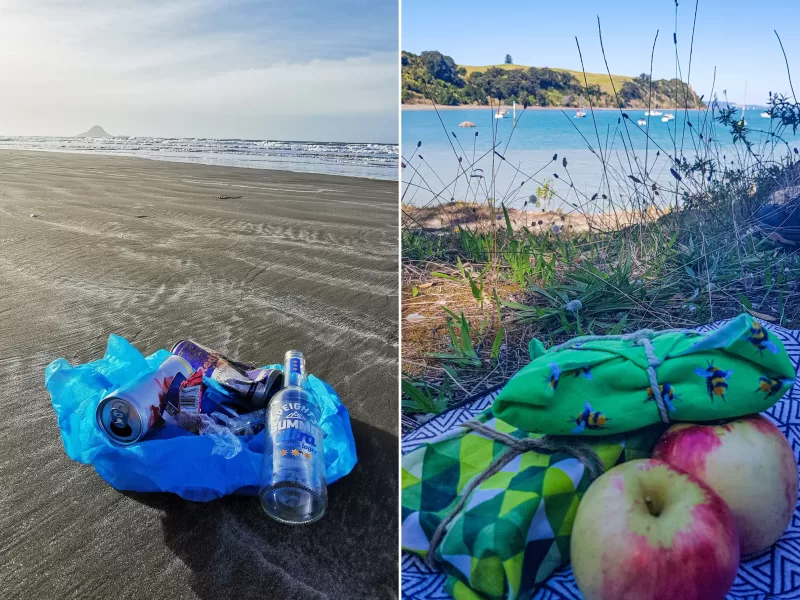
Most people know this motto and try to practice it to some extent. However, we seem to only really think about it in terms of hiking or being in nature. The leave no trace motto is one we should be applying whenever and wherever we travel. Whether that is in a large city or a small town, we shouldn’t be leaving a negative impact there. So leave no trace when you are hiking and when you are eating street food.
What does this look like? Obviously it’s different for every situation, but let’s look at the example of eating street food. I’m guessing that street food came in some kind of vessel, right? It may even have a wooden fork with it. What are you going to do with it once you’re done eating? Will you throw it on the ground, throw it in the bin or find out if it’s recyclable and put it in the correct bin for recycling? Perhaps it’s compostable and you can take it to a local community garden to add to their compost heap. Better yet, do you have your own reusable container and utensils with you, so you don’t need to use the disposable container at all?
We carry cutlery with us at all times, along with a metal straw each, metal water bottles and some hand sanitiser. We have recently started bringing along a keep cup as well. Once we get into the habit of remembering the keep cup, we will try to add a reusable container to the mix. It’s all about slow sustainable change to ensure we can keep up these good habits. We aren’t saying you have to implement all these changes right away, we certainly aren’t. But use what you have and slowly make these sustainable changes to reach the goal of leaving no trace. For more tips specifically on eco-conscious travel, check out our “eco-conscious travel tips that anyone can implement”
Use Your Drone With Respect
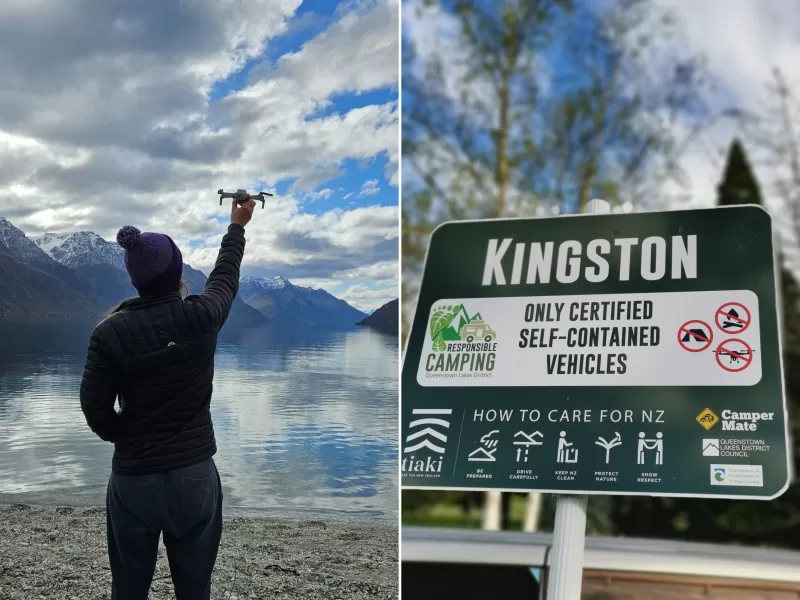
This one fits in nicely with thinking about those around you and respecting the country you are visiting. Drones are increasingly becoming a problem because people think they can fly them whenever and wherever they want. Firstly, this is never the case, as you have to adhere to the aviation laws even if you are permitted to fly your drone at your chosen location. Secondly, you need to do your research to ensure that you aren’t being disrespectful or unsafe in how and when you fly your drone. We’ve not had much of an opportunity to fly Dizzy (our drone) in Aotearoa as there are a lot of flight paths here making drone flight unsafe, there are Tāpu (sacred) areas that it is incredible disrespectful (and not allowed) to fly drones over and there are National parks where you need special permission to fly a drone so as not to interfere with any park works/ disrupt bird life.
Before flying your drone, check the rules and regulations around recreation drone use in the country you’re in. DJI offers a worldwide guide on where you can and can’t fly. Click here to check it out before you leave, as it might be better to leave the drone at home. There are also country specific sights to check. For example, Aotearoa, New Zealand has an app called AirShare that shows you where it is safe to fly. But that’s not the end! You still need to check with local councils and look for signs in the area saying no drones. If these things say you can fly, then you are good to go. We thought we could fly Dizzy at the freedom camp in Kingston, both AirShare and DJI said it was fine but the sign at the front of the camp said otherwise! So you always need to check before lift-off.
We have had a few conversations with drone users about this process, and not many people seem to do it. Drone use in Aotearoa has gotten stricter the more that people do the wrong thing, so make sure you follow the rules. If you see someone doing the wrong thing, call them out if you feel safe to do so or take a picture and report them to the local aviation body. We’ve actually had someone fly a drone over us at the dam in Taupō and someone flying less than 2 meters from a big sign saying no drones permitted. We called them out on both accounts. One of them didn’t care and continued flying, but the others apologised and put the drone away. As conscious travelers, we need to have these discussions with others to help change happen. If they don’t want to listen, at least you tried.
Where You Are Matters
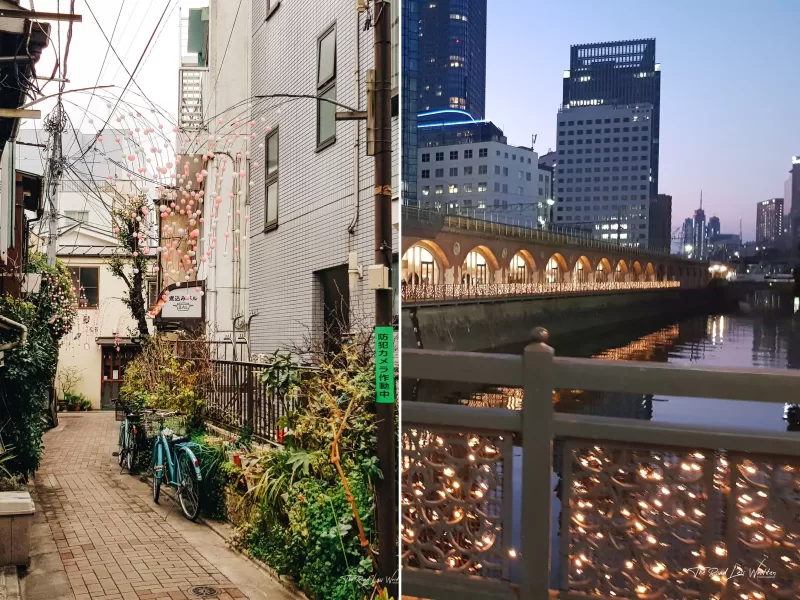
Take a moment when you are planning your travel to research the country you are planning to visit. We don’t mean the sites you want to see or even the food you want to eat there. We mean the country, the land and the people. Whose land will you be living on? What do they ask of their visitors when they enter the country, and how can you uphold and respect their culture when you are there? This is extra important when you are visiting colonised lands. Find out what the first people want you to do to respect their lands and culture. Simple ways to start showing that respect is to use original names for the places you are visiting instead of the colonised names. Another way is to partake in a cultural tour/activity or, if you can, pay the rent and give back to grassroots first nations organisations in the country you are visiting. If the languages used in the country you are visiting are not your own then learn a few key phrases and greetings in the dominant languages there. At a minimum make sure you know how to say hello and thankyou.
Other questions to ask when you travel to a new country are:
- How is their culture different from mine?
- Do I need to change how I carry and present myself to be respectful of the country’s culture?
- What’s the history of this country and how can I be mindful of that when travelling and interacting with different people?
- Is the country currently in a position to welcome tourists or have they just experienced something that means tourists should keep away?
- Are locals calling for no tourists due to the negative impact tourists are presenting to their homes and way of life? Like the island of Maui and Hawaii as a whole.
- How can I make this trip the most eco-friendly?
- Am I supporting the local economy or is my money going to big worldwide companies?
As guests in someone else home, we need to respect their wishes and ways of living. This is the same when you travel to another country. If it’s considered disrespectful to not wear a head covering when visiting a temple, for example, then make sure you wear the head covering. Read signs when you visit places of cultural significance and you will generally be fine.
Most places are aware that tourists are not familiar with their practices and will inform you of how to be respectful. We need to realise though, that this isn’t always the case and shouldn’t really be the responsibility of the place you are visiting. We as travellers need to take some of that responsibility into our own hands and do the work before we enter the country. Ways to research the country you are visiting include reading blogs, books or travel journals. It also doesn’t have to be reading, if that’s not your thing. You can always watch a movie or YouTube the region.
In your research, include some sources from locals and not just people who have traveled there themselves. Tiff loves to include reading fiction and poetry books from local authors in this research process and reading such books whilst we are travelling in the country. Purchasing a book from a local independent bookstore written by a local author is a great way to ensure you support the local community and you get a wonderful travel keepsake too!
Take The Road Less Written and Travel Slowly
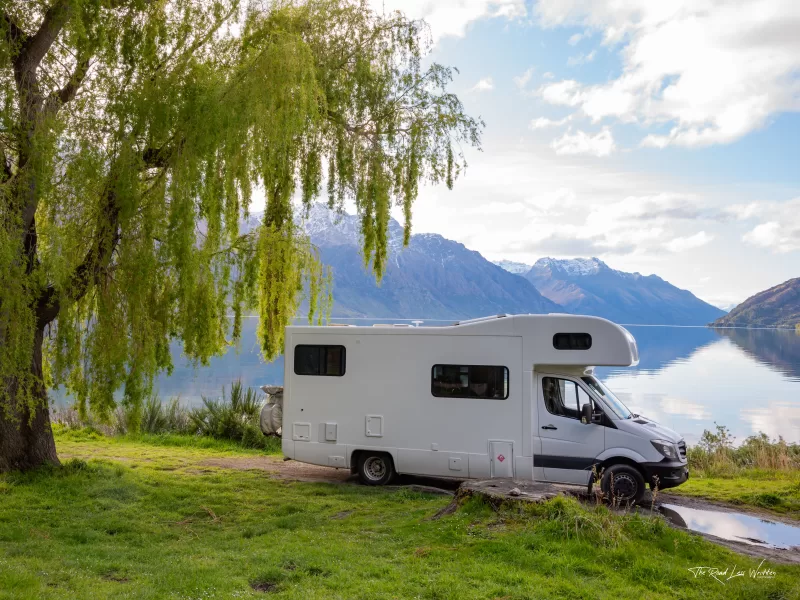
How long do you need to be in a country to truly experience it? A day, a week, a month? There is a heavy travel culture of trying to visit as many countries as you can. Whilst this sounds cool, it is incredibly taxing not just on yourself but also on the environment and the countries you are visiting. Taking lots of flights in quick succession to get to multiple countries in the two weeks you have off from work isn’t doing anyone any favours. And probably leaves you needing a rest from your holiday.
We aren’t saying not to travel. We are just saying try to slow down and experience the place you are visiting. Be mindful in your actions and get to know the people and their ways of living. This truly is what travel is all about, not just crossing off Instagram destinations. It’s immersing yourself in different natural environments and experiencing different ways of life so that you can grow. When you travel this way you get the chance to make friends and meaningful connections on the way as well.
Travelling on the road less written, that is visiting places that the masses don’t go to and taking your own path makes a big difference to the impact you have on the local economy and environment. Alternatively, if you want to go to a tourist hot spot, go during off or shoulder season to lessen your impact. This also does wonders for your budget as well! We cover this a bit more in our eco friendly travel blog here.
Travel With Your Values
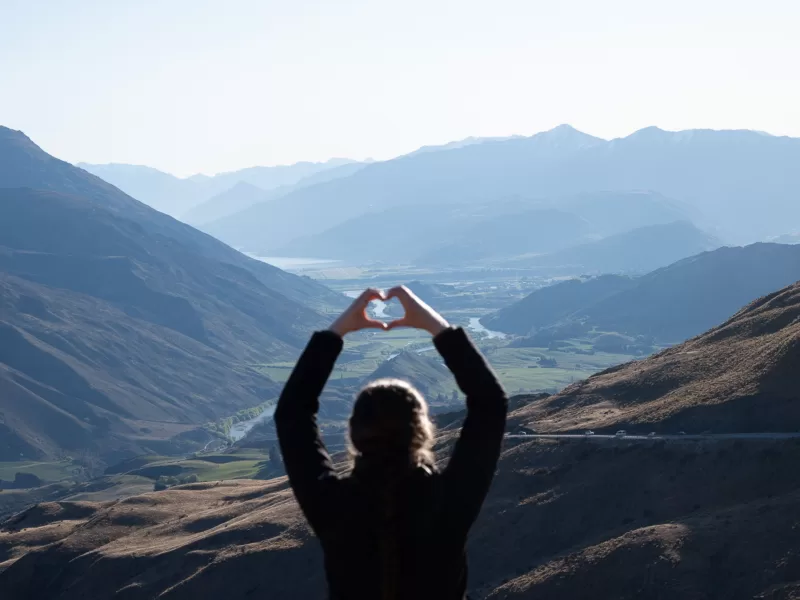
Another side of this conscious travel discussion is to think about the values the leaders of these countries we are visiting hold. Is this a place you want to support by spending your money there? We look into the way the government treats its people and if it imposes laws we don’t believe in. For example, countries that don’t support or uphold the rights of LGBTQIA+ people are countries that we don’t want to visit.
Sure, we may miss out on seeing things we wish we could. But on the other hand, we don’t wish to visit somewhere that doesn’t look after all of its people and isn’t safe to visit. Where we choose to spend our money, whether we realise it or not, says a lot about our values and what we support. To be a conscious traveller, we need to be aware of this and act accordingly to uphold our values.
There’re Many Steps You Can Take For Conscious Travel
The list isn’t exhaustive, it’s just a good place to start. We are constantly finding new ways to be conscious in our travel journey and we will continue to take you down this road with us. We do our best to hold each other accountable and continue to grow. However, we’d love this to be a conversation between travellers so we can all grow together.
Let us know what you do to be a Conscious traveler, either below, or on our socials. If you see us being less travel conscious than we should be, then kindly let us know on our Instagram. Let’s keep each other accountable and learn ways to travel better together!
Keen for more inspo? Be sure to check out:
- Eco-Conscious Travel Tips That Anyone Can Implement
- 4 Freedom Camping Apps to Make New Zealand Travel Simple!
- Don’t Make The Same Van Life Mistakes We Did!
